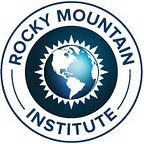RMI in Brief
News From Around the Institute
A MODEL FOR SCALING NET-ZERO ENERGY LEASED BUILDINGS
RMI’s new office in Boulder, Colorado, is the largest multitenant leased net-zero energy project in the country. And the innovative lease that makes it possible and profitable for both the developer and the tenant is paving the way for others to follow, as highlighted in RMI’s guide Best Practices for Leasing Net-Zero Energy Buildings. And, through the Boulder Energy Challenge, the team is providing training to area developers to put these concepts into practice, and make high-performance buildings a solution to the city’s target of reducing carbon emissions by 80 percent by 2050.
RMI RECEIVES OFFICIAL REGISTRATION AS A FOREIGN NGO IN CHINA
RMI’s Beijing office received its official registration as an international NGO from China’s Ministry of Public Security. The National Energy Administration (NEA) will supervise RMI’s operations in China. As the only foreign NGO to be supervised by the NEA, Rocky Mountain Institute looks forward to continuing to support China’s energy transformation and sustainable development in the long term.
EQUIPPING CITY LEADERS TO TAKE ACTION ON CLIMATE COMMITMENTS
The Carbon-Free City Handbook, released at COP23 in Bonn, Germany, reveals 22 actions — and associated resources — for cities around the world to move toward climate neutrality, seeing results within one year. This new RMI resource helps city leaders and staff implement climate policies and actions that resolutely place their communities on an aggressive path toward sustainable, low-carbon economies. Read more here.
DRIVING TOWARD A NEW MOBILITY FUTURE
With help from RMI, Austin, Texas, is working to shift its mobility system to one that enables shared, electric, and autonomous mobility services. As part of that effort, the RMI mobility team recently codeveloped and deployed the Market District commuting pilot, created a low-price purchase/finance program for electric vehicles for drivers of the Ride Austin transportation network company, and identified 330 vehicles in the City of Austin’s fleet to be replaced by electric vehicles. The City has agreed to purchase those vehicles by 2020.
MORE ISLANDS GO RENEWABLE
The British Virgin Islands and Barbuda have retained RMI’s islands team to redesign their electricity systems, which were severely damaged last year by Hurricanes Irma and Maria. The focus of the system redesign is to shift from centralized fossil-fuel systems to decentralized renewable systems. Meanwhile, with help from RMI, Saint Lucia is constructing the country’s first utility-scale solar farm and Saint Vincent and the Grenadines is planning for its first solar-plus-battery storage microgrid system on the island of Mayreau, which will be the first of its kind for the Eastern Caribbean.
RMI REIMAGINES THE UTILITY
As the power system becomes increasingly distributed and decarbonized, the question, What is the right role and business model for electric utilities? is getting a lot of attention. RMI’s new report, Reimagining the Utility: Evolving the Functions and Business Model of Utilities to Achieve a Low-Carbon Grid, provides an analytical lens for evaluating utility reform. The report discusses how decision makers in the industry must adapt their operating strategies to achieve win-win solutions for industry incumbents, new market entrants, customers, and the environment.
RUN ON LESS PROVES EFFICIENT TRUCKING IS POSSIBLE
Run on Less, a first of its kind cross-country road show, proved that 10 mpg is possible for big rigs using efficiency technologies that are available on the market today. If the 1.7 million trucks on North American highways today achieved the same level of efficiency as the trucks that participated in Run on Less, they would save 9.7 billion gallons of diesel fuel, $24.3 billion, and 98 million tons of CO2 each year.
FREQUENT FLIERS FIGHTING CARBON
RMI staff fly all over the world and that releases carbon, so we are now mitigating the carbon impact of our journeys by supporting projects that take carbon out of the atmosphere. The Good Traveler initiative, managed by RMI, allows anyone to pay for carbon off sets, which are projects that are certified to take climate-wrecking greenhouse gases out of the atmosphere, or prevent them from being released, while doing some extra good like restoring wetlands, growing forests, or catalyzing new efficiency technologies. You can use The Good Traveler, too. A single $2 purchase off sets the carbon you release in 1,000 miles of flying or 400 miles of driving — that’s equivalent to about 156 kilos of carbon dioxide. Learn more at thegoodtraveler.org.
THE POWER TO CHOOSE CLEAN ENERGY IN REAL TIME
WattTime — an RMI subsidiary — and Microsoft recently launched a new way to give customers the power to understand and reduce their carbon emissions. Microsoft’s free and open-source Real-Time Carbon Emissions Platform will be the first software to automatically detect the precise carbon emissions caused by using or generating electricity at any particular time and place in Europe, in real time.
RMI PODCASTS: A NEW WAY TO CONNECT
In April 2017, RMI launched its first podcast with an interview with CEO Jules Kortenhorst about “applied hope.” Since then, we have aired 19 podcasts with experts covering topics such as community-scale solar, global climate finance, net-zero energy homes, and more. Our podcasts have also covered events live from Climate Week and COP23. Now you can listen to them all at rmi.org/about/news-and-press/.
